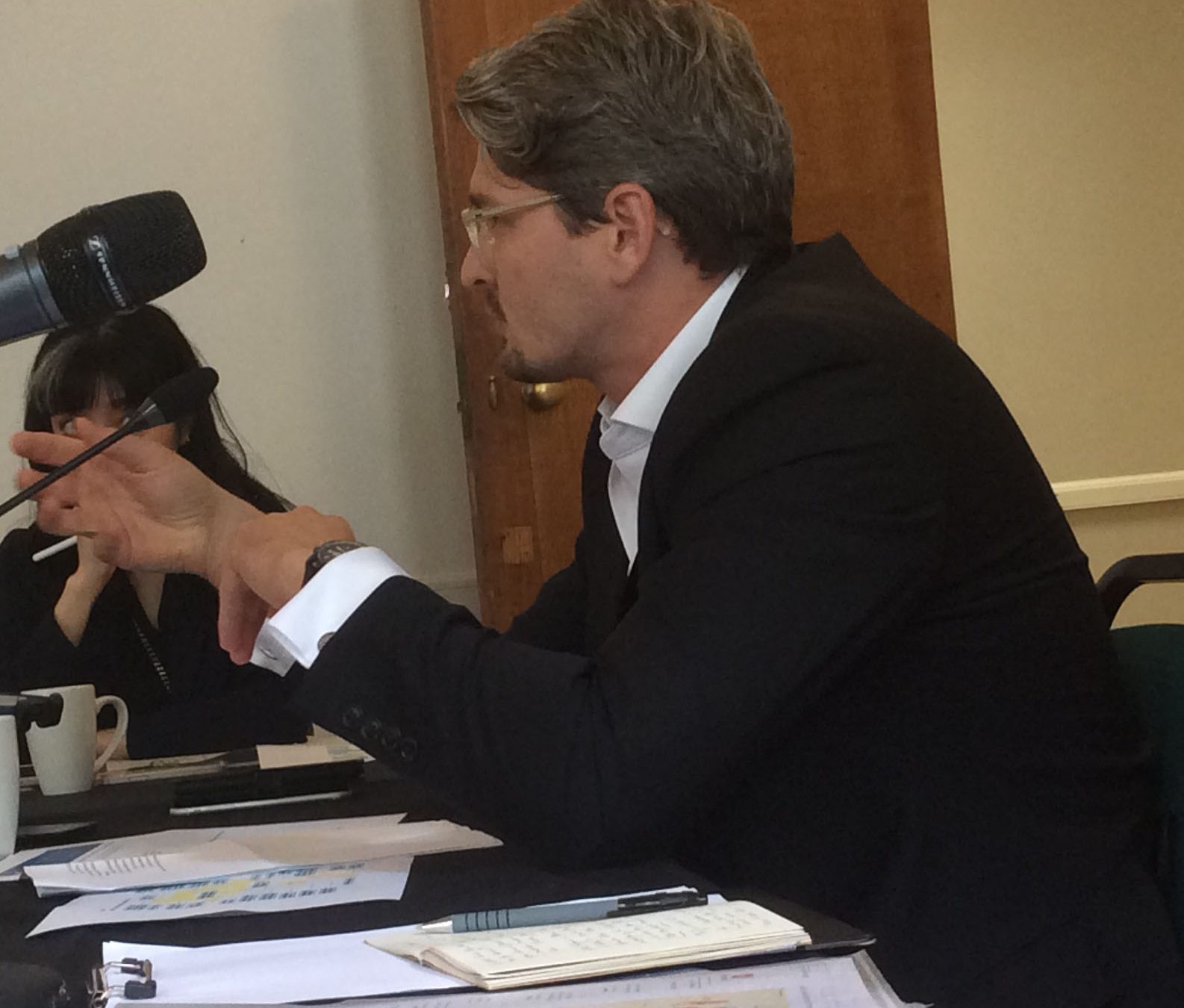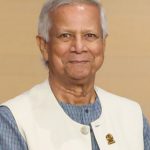Andreas Krieg, an expert in surrogate warfare and the growth of private military companies, has assessed the Kremlin’s efforts to re-mould the notorious Wagner Group after the death of its charismatic leader Yevgeny Prigozhin. He spoke at an AEJ meeting on 13 September 2023.
By Quentin Peel
The death in a plane crash of Yevgeny Prigozhin, Russian warlord and erstwhile close associate of President Vladimir Putin, and Dmitry Utkin, his military commander in Ukraine, has left the future of the Wagner mercenary group that they founded in doubt. Denounced by the UK government as a terrorist organisation, by the US Treasury as a transnational criminal operation, by the EU as guilty of serious human rights abuses, torture and looting of natural resources in a string of countries across Africa and the Middle East, Wagner is both a vital Russian security asset, and an entity without any legal status in that country. Its fighters are simultaneously denounced as traitors for attacking Russian soldiers in the insurrection led by Prigozhin in June and championed by Russian nationalists as heroes for being the most effective combatants in Ukraine.
To Andreas Krieg, senior lecturer in security studies at King’s College, London, it is all that and more. At the latest lunchtime meeting of the UK branch of the Association of European Journalists, he described it as a perfect example of a 21st century horizontal security network, representing a profound challenge to the vertically-organised hierarchies of traditional western – and Russian – security services.
The question now, after the presumed assassination of Prigozhin and Utkin with the blessing of Mr Putin, is whether it can be reinvented as an openly financed arm of the Russian state, taken over by a new freelance leader, or whether it will simply disintegrate.
Founded by Prigozhin and Utkin in eastern Ukraine in 2014, the Wagner group expanded its operations into Syria in 2015, Libya in 2018, and then via the Sahel region to countries across sub-Saharan Africa. Dr Krieg describes a hybrid organisation today of more than 400 different entities ranging from traditional mercenary warfare to counter-insurgency, protection and security for heads of state and mining companies, psychological warfare, subversion and propaganda, mineral extraction (especially gold and diamonds) and commodity trading, financial services, money-laundering, transportation and logistics.
“Despite the fact that Prigozhin was a central hub, they were mostly floating entities in the Wagner network,” he said. “It is a very hybrid organisation. That is why it is very difficult to fight and very difficult to control.”
In Wagner’s early days, its personnel were professional recruits largely from the Russian special forces. Both training and finance came from Russian military intelligence – the GRU. From the Russian point of view, however, the great thing about Wagner was that as a private military contractor its operations were deniable, and where it suffered casualties – as in Syria – they were also deniable.
“Russia didn’t have the capacity to do what Wagner could do,” he said. “But it can lead from behind. That is what network-centric tactics are all about.”
He said that since 2018, Wagner had become an increasingly self-funded organisation. It received about $1bn a year from the GRU, and a roughly equal amount probably came from its own commercial operations. Its intervention in Libya in 2018, in support of the self-styled Field Marshal Khalifa Haftar, was financed via the United Arab Emirates, although it was an open question whether that was Emirati money or Russian money.
He described the UAE as the other “central hub” of the Wagner network, alongside Prigozhin himself.
Wagner “needed a non-sanctioned territory with unrestricted access to global financial markets,” Dr Krieg said. “Dubai and Abu Dhabi were ideal.” They were very well connected and had enjoyed “a very integrated intermediary relationship with the Russian state” for years. The UAE not only provided financial connections, but also private entities and big planes capable of carrying arms and munitions in and out of Africa with “no questions asked”. The UAE was a leading gold and diamond hub in the world market, able to buy gold, melt it down and turn it into cash in the same locality. “Wagner has very big commercial relationship with them.”
Turning to the future, the speaker said that “Prigozhin’s death doesn’t mean the network will collapse.” The Kremlin was now seeking to “rein it in” but the outcome was still far from clear. Unlike the vertical command structure in defence ministries, including the Russian military, Wagner had always given the initiative to individuals on the ground. It was a hydra-headed structure. “They have been very flexible in hiring professionals and locals, and in integrating with local networks.”
Whereas the GRU was closely involved in Wagner training and finance in Ukraine and in Syria, the relationship was much more distant in Africa. However it now looked as if Putin and his defence ministry wanted to integrate Wagner into their own vertical hierarchy. The Russian military was seeking to move “from being a client… to being a stakeholder.” But that might prove very difficult to accomplish, precisely because the ministry was a relatively rigid vertical hierarchy, and Wagner had a hybrid and flexible horizontal network.
“Every link that Wagner has made in Africa would have to be re-negotiated.” If these contracts were taken over by the Russian defence ministry, “it would completely undermine Russian deniability.” It would also be bureaucratic and inflexible in dealing with African governments and local entities on the ground.
An alternative scenario might be to find another freelance Russian operator to take over the network – such as Viktor Bout, the Russian arms trader recently involved in a prisoner swap between the US and Russia. But he would not enjoy anything like the close personal relationship that Prigozhin had with Putin, which for a long time had allowed the former extraordinary latitude in his dealings with the rest of the state bureaucracy.
Dr Krieg was questioned about whether it was realistic to regard Wagner as semi-autonomous, given its close ties to the GRU, and reliance on finance and training from Moscow. He said there were a variety of models in the relationship. “Some African entities have no association with the Russian state…Wagner has a long lead in certain operations, a short lead in others. The GRU has control inside Russia, but not in Africa.”
It was clear that “if you give training, arms and finance…you get some control.” But there was no proof of effective overall Russian control. “Wagner took the initiative, and Russians jumped onto it.”
He was asked if UAE money used the City of London for financial operations linked to Wagner. He agreed that many City companies had offices in Dubai, and therefore close ties. In practice, however, up to 80% of total revenues could be lost to covering the inevitable costs of money-laundering – that is, turning the value of gold and other precious goods into innocent “white” money.
He said that the UK parliamentary select committee report on Wagner, while very critical of the “complacency” of the UK government towards its mercenary activities, had itself pulled its punches on the UAE connection, because of heavy lobbying by the Emiratis. The UK also sees the UAE as a key partner for its strategic and commercial interests, and regulators are often seen to “give the UAE a pass”.
He added that French, UK and US engagement in Africa in fighting insurgencies was dominated by the vertical hierarchies in their defence departments. They believed in state-to-state co-operation. They were much less effective in warfare such as counter-insurgency (and therefore much less popular with African governments) than private military contractors such as Wagner.
“The Russians are only good because we are so weak,” he said. “We don’t understand local audiences. We are living in an echo chamber where we think the whole world is with us on Ukraine. We have the networks and the capabilities, but we lack the strategic vision.”
 Quentin Peel is an associate fellow at Chatham House and a former foreign editor of the Financial Times.
Quentin Peel is an associate fellow at Chatham House and a former foreign editor of the Financial Times.








